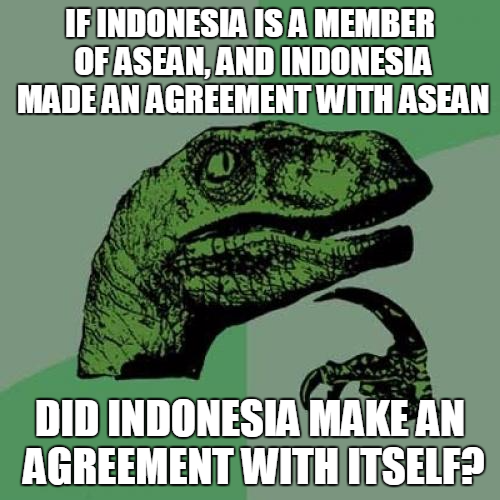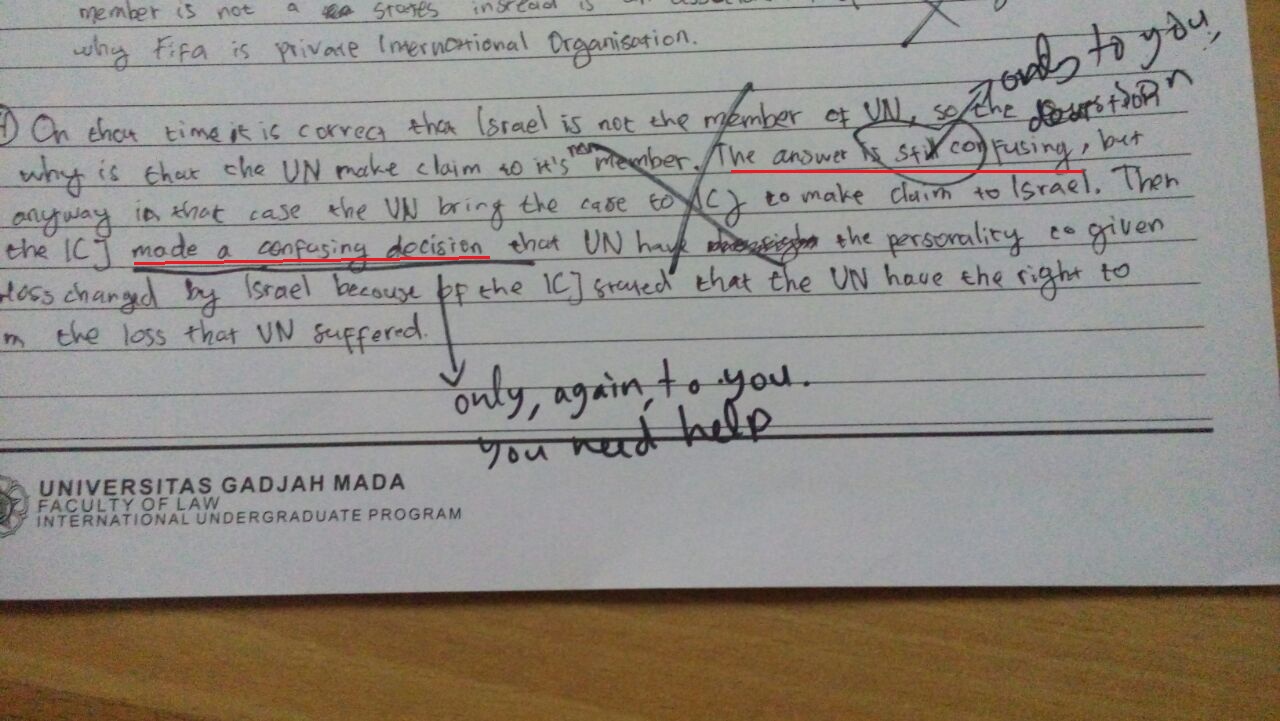Assalaamu’alaykum warahmatullaahi wabarakaatuh.
Especially for IOL Class B, I hereby announce your mid semester results. The results of some of you make me really proud and happy, while others would necessitate both you and me evaluating our performances in teaching (me) and studying (you). There were some things that make your job easier, since you can choose which questions to answer and which one to ditch. On the other hand, you had to do extra work which is counting the weight of each questions to make sure it doesn’t exceed or fall short from 100 points.
If you have any questions or objections, please do not hesitate to contact me either via whatsapp or email so we can meet up and discuss about your answers. I will give you up to 14 days after this announcement to contact me. It will be great if you can group up with up to 5 students at a time, so you can meet me together.
However, please check the evaluation that I will share below before you meet me so you can reflect first.
As you may know already, after the Mid Semesters you will be with Mas Rangga. So, I hope you have a good time with him and take as much knowledge as you can.
Good luck!
EVALUATION
- Legal Opinion for United Asia
At the minimum, the advice has to contain the following:
Japan has to lead the conference for the drafting of constituent treaty. Then, while waiting for the treaty to enter into force, provisional measures shall be undertaken – this may be done by an international committee consisting of several States or individually.
Since in this case Japan offered, it makes sense if she also takes care of the provisional measures, which are: Appointment of HQ town (done) and preparation of Secretariat in Kyoto (Japan should also initiate drafting of Headquarters Agreement between UA and Japan), Recruitment rules of organization, Rules of procedure, especially for plenary organs; and Where the first ever session will take place (since Kyoto secretariat is not yet built)
Common Mistakes:
Not many students took this question, thus its hard to find a common mistake. Mostly imperfections, meaning only few of the above were mentioned.
- Organizational Customs and Customary International Law
This one should be simple. The former is a practice only occurring within particular organizations and therefore becoming law only for that organization, examples being the appointment of observer states in the United Nations which is nowhere to be found in the charter. The latter has a wider scope of applicability as source of law in the international community, such as the international law of treaties.
Common Mistakes
Common mistakes are usually in the lack of examples. Other mistakes include mentioning constituent treaty provisions instead for organizational customs.
- Indonesia Making an Agreement with itself
Of course Indonesia is not making an agreement with itself, due to the separation of international legal personality between the IO and members.
Common Mistakes
Many of you answered this question correctly. Mistakes include explaining everything except what matters most: “separation of legal personality”. Some of you seem to be confused, answering “yes making agreement with herself” at the start of the paragraph but then saying “no, not making an agreement with herself” in the middle.
- International Legal Personality of the UN to Israel: The Assassination of Count Fokke Bernadotte
The answer to this question can be approached in two ways, either in that the UN has objective legal personality due to its size and representation of world powers, or that Israel has accepted the UN mission which consequently comes with recognition of UN’s international legal personality.
Common Mistakes
Some students answered how the UN has international legal personality implicit in the charter, judging from its object and purposes. This does not help answer the question because it is technically only explaining whether international legal personality can be inferred from the treaty. The question still stands: can international legal personality given in the treaty –whether implicit or explicit—be applied to third states?
Others answered because there is damage caused. The problem is that damages like this or other forms of breach of law, would be the material parts of the case. Problems of legal personality relates to a formal part of the case which is seen separately from the material matters.
- Ban Ki-Moon’s Statement: Moral Responsibility
Ban Ki-moon’s statement makes it sound like there should be a reconsideration by international courts when determining UN’s immunity from responsibility for actions of its agents, but this is not entirely the case. What he said was “moral responsibility”, which is open to interpretation but definitively not legal responsibility. In essence, there is no legal consequence of this statement.
Common Mistakes
Many of you assumed that this statement will incur legal consequences, because the Secretary General represents the UN. The powers of a Secretary General is a separate topic, but at the very least, the statement “moral responsibility” cannot be understood as to mean “legal responsibility”
- Development of Legal Reasoning behind the Implied Powers of an IO
At first, the reasoning was that the law of an organisation shall be interpreted so as to guarantee effet utile (full effect). That’s why, even when not expressly regulated, an organisation must be implied as having certain powers if that guarantees the full effect of the treaty that provides the express powers. Case laws: ECCS, Fédéchar and ECJ, Germany v. EC. However, now the preferred reasoning may be seen in ICJ, Reparations, which is more restrictive: Implied powers cannot freely be surmised; instead, they can only be concluded only if (1) necessary; (2) for the implementation of an express power. Application of this reasoning may be done in ICJ, Effect of Awards.
Common Mistakes
Only very few took this questions, nobody did it right. Basically mentioned nothing of the above.
- Public vs Private International Organizations
The statement has its own problems. One can consider a number of angles. For example, while membership of states are certainly one of the distinguishing factors, is it the MAIN factor though? Some have argued convincingly that it is the constituent treaty being an international treaty that is the MAIN distinguishing factor. Others have argued another angle, that the statement is only true if we understand membership as to include only FULL MEMBERSHIP since public IOs can also have non-States as members but just not as full members (associate or affiliate members).
Common Mistakes:
Most mistakes are in form of not mentioning any of the aforementioned items which are definitely challenges towards the statement.
- Membership of the UN: UNGA support vs UNSC veto
While it’s true that a recommendation is a non-binding product, it doesn’t mean the GA and SC can work independently when it comes to admissions. The GA cannot decide unless SC recommends. The language of Article 2 para. 5 Charter is clear: GA “decides upon recommendation” of SC. ICJ, Second Admissions clarifies that there is dependency of GA on SC in this matter, as both the recommendation and decision form “judgement of the Organization” that Article 2.5 provides.
Common Mistakes
Most students who chose this question answered this correctly. The few mistakes were dreamy answers that used English words but bore no meaning (sadly), or instead “yes it can if there is 2/3 positive votes in the GA”
- Withdrawal from an IO which has no provision on withdrawal
Yes, withdrawal can still happen because the constitutive instrument of an IO is an international treaty. Having that said, it will fall under the laws of international treaty as per the Vienna Convention on the Law of Treaties. We have provisions regarding termination of treaties there which can be used.
Common Mistakes
This one had a number of interesting mistakes.
First, some of you cited random articles from the Vienna Convention claiming that its about termination of treaties, but they were actually about something else.
Second, some of you said: “They can still withdraw. If there is no withdrawal clause, there are other mechanisms such as expulsion of membership or disbanding the organization. So, you are saying that if Indonesia wants to quit the UN, Indonesia should go, like, “I wanna quit but no withdrawal clause, so BUBARKAN UNITED NATIOOONS!!!”
Sehat mas/mbak?
- Brebes Exit
Article 50 of Lisbon provides for three stages of withdrawal: Intent of the Member based on her own constitutional requirement(s); Notification of withdrawal to ECouncil (“triggering Article 50”), starting the negotiation for a withdrawal agreement governing future relations between that Member with EU; and Entry into force of the withdrawal agreement or, if an agreement is not reached, withdrawal takes effect two years after Article 50 is triggered.
That said, UK is still a full Member. All she has done is withdrawal referendum (i.e. intent based on UK’s constitutional requirement). No notification has been posted to ECouncil, so negotiation for withdrawal agreement cannot yet start. This notification is entirely UK’s prerogative, so, so long as she has not done it, she remains a Member of the EU.
Only the intent of the Member may be correctly considered as unilateral. The rest of the process requires negotiation with EU, thus the entire process cannot be seen as unilateral.
Common Mistakes
Some mistakes are that students say that the UK is no longer a member of the EU simply because of the referendum, clearly not knowing anything about the EU procedure of withdrawal. Some other mistakes are that some of you seem confused as to what “unilateral means”
THE [REVISED] GRADES
Notes: Dear all, I must apologize for making lots of mistakes in the previous grade announcements. Not just for the actual mistake, but also the drama it may have caused. Interestingly, I did not accidentally increase anyone’s scores. Only decreased, by mistakes such as typing 72 as 27, or typing 91 as 9, etc.
So here are the revised scores, inshaaAllah this one is the right list.
| Number | Grades |
| 2525 | 56 |
| 19665 | 13 |
| 19681 | 63 |
| 19682 | 66 |
| 19793 | 100 |
| 19804 | 53 |
| 19812 | 38 |
| 19818 | 71 |
| 19829 | 63 |
| 19830 | 31 |
| 19837 | 43 |
| 20189 | 83 |
| 20191 | 48 |
| 20192 | 68 |
| 20193 | 6 |
| 20198 | 8 |
| 20200 | 73 |
| 20201 | 23 |
| 20203 | 89 |
| 20206 | 91 |
| 20207 | 10 |
| 20229 | 100 |
| 20236 | 60 |
| 20241 | 48 |
| 20250 | 63 |
| 20254 | 36 |
| 20259 | 53 |
| 20261 | 49 |
| 20265 | 71 |
| 20280 | 48 |
| 20281 | 38 |
| 20286 | 77 |
| 20290 | 21 |
| 20294 | 60 |
| 20296 | 100 |
| 20297 | 49 |
| 20299 | 73 |
| 20304 | 45 |
| 20306 | 6 |
| 20479 | 86 |
| 20481 | 72 |
| 20482 | 48 |
| 20483 | 51 |
| 20488 | 57 |
| 20489 | 98 |
| 20492 | 33 |






